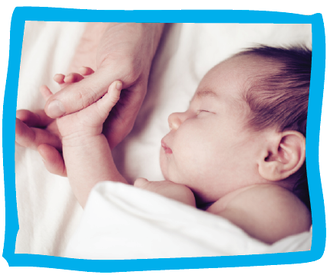7 Things to know about newborn babies
|
Every newborn baby is unique, but they already have the most amazing brain ready to soak in new experiences and the ability to learn. Here are a few basic things you need to know about your newborn baby's senses and development.
|
You might also be interested in ...
5 Tips on how to look after your baby’s skin
Babies have delicate skin which can sometimes become irritated by things like textiles, talcum powders, soaps and other common baby care products. Often, the culprits are harsh chemicals, which can not only harm your baby's sensitive skin, but can also damage the planet. Here are 5 ways to help look after your baby's skin using eco-friendly baby products, which are better for your baby and for the environment.
8 Sleep tips for the Christmas holidays
Even babies and kids who are usually good sleepers may find it difficult to get enough sleep or settle during the busy Christmas period. So here are some useful sleep tips for the Christmas holidays to help ensure your baby and kids sleep is not disrupted during this hectic time of year.







Here are a few basic things you need to know about your newborn baby's senses and development.
7 Things to know about newborn babies
1. A newborn baby’s brain
Despite a newborn’s small size at birth, their brain is already around 25% of adult size.
While a lot of brain development happens in the womb, much of the connecting of neurons and strengthening of these connections happens after birth.
The way the brain connects and develops is influenced by a baby’s experiences and interactions with people and their environment. The biggest influence being their primary caregiver, the person they are with the most who is doing the caretaking.
Brainwave trust says 'our genes are not a static blueprint; they can actually alter with experience in the sense that they can be switched on or switched off'. Nature and nurture operate together to fashion our brains.
Put simply, genetics play their part in brain development, but infants need a positive environment, rich experiences and an environment where their needs are consistently met for their brain to make all these connections.
Babies need love, attentive care and affection to flourish.
2. A newborn baby's reflexes
Your newborn baby is born with instinctive reflexes. Many are about survival.
Some disappear abruptly, usually between 3 and 6 months of age, while others are gradually replaced by more intentional behaviour.
A few common reflexes are:
3. What can a newborn baby see?
Vision is the least developed of the senses at birth.
People and objects seem a bit ‘fuzzy’ and their eyes can only see about 20 to 30 centimetres in front of them. However, they most easily notice movement and high contrast patterns.
Babies are instinctively fascinated with the human face. From these interactions attachment starts with face to face contact, an important part of getting to know each other.
Find out more about what your baby's eyesight and what baby's can see.
4. What can a newborn baby hear?
Babies can already hear in the womb and there have been studies showing they are born with a preference to their mother’s voice and their own language.
Babies respond to the pitch and tone of your voice. They are born with an innate interest in language and sounds and you may notice them turning their head or eyes towards sound in the first eight weeks.
5. What does a newborn baby feel when touched?
Newborns are extremely sensitive to touch and texture and will feel the lightest of touch on their skin.
They can be particularly sensitive to change in temperature, which is why you may get a large squawk in protest when you take off their nappy or change their clothes.
Newborns are particularly sensitive to touch around their hands, mouth and feet.
Be gentle with all your interactions including wiping your baby's face clean and at bath time. Ensure the water is nice and warm without being too hot and that the room is also warm when they get dressed.
Use gentle baby massage after bath time. Massage triggers sensory receptors sending signals to their brain helping it to make new connections.
6. Why do newborn babies cry?
There are so many reasons why babies cry, but essentially crying is how babies communicate and tell us that they are cold, hungry, lonely, tired etc.
A tired cry will sound different to a cry of pain for instance and you will start to hear the difference.
Responding quickly and consistently with nurture and care to a baby’s cry is the cornerstone for healthy attachment and emotional development. From this a baby learns to trust others, feel safe and loved.
There is a reason a newborn baby’s cry can be surprisingly loud for such a tiny being, it is designed to be impossible to ignore. They might be the smallest in the house but are at times the loudest!
7. Enjoy this time
The early months will go so fast and soon turn into the early years, so treasure this time you have with your little one.
Tell your friends
Like the article you've just been reading? Click on the Refer A Friend link at the top of the page and send the details to friends who might like to read it too.More Hot Topics for you to enjoy
Source: This article has been written by Creators, a nationwide service offering quality home-based care and education. Creators are passionate about seeing every child’s unique talent being recognized and nurtured.